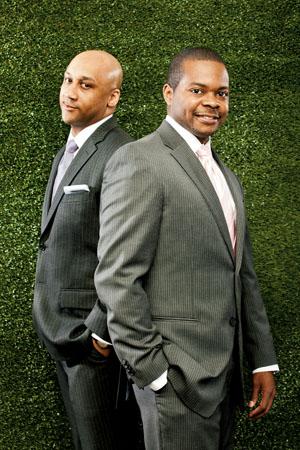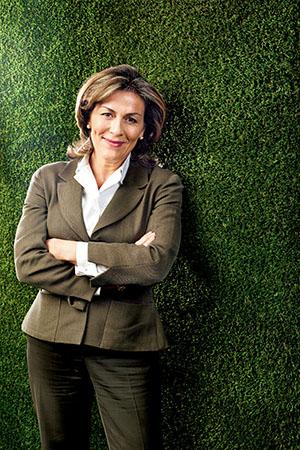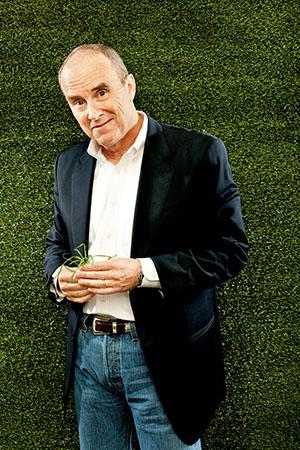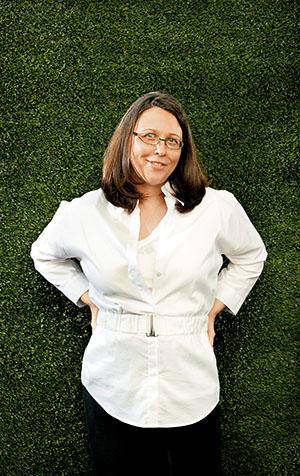
Philip O’Neal and Rhon Hayes: Creating a Green Job Corps
When people hear about Green DMV, “they think we sell hybrid cars,” says Philip O’Neal. He and Rhon Hayes are founders of Green DMV—the initials stand for the District, Maryland, and Virginia— a nonprofit whose Green Job Corps trains disadvantaged people for “green” jobs doing energy audits, installing solar panels, and weatherizing buildings. One Green Job Corps graduate works at Washington Gas Energy Services. Another is working on DC weatherization projects as part of the government stimulus package. Last month, the Green Job Corps began training a new class in Alexandria.
Green DMV and its job-corps graduates were part of the CarbonfreeDC project, which was one of five winners in a National Geographic Society competition to encourage green projects in local communities. CarbonfreeDC’s Extreme Green Neighborhood Makeover project renovated 20 houses in the District’s Deanwood neighborhood to lower their energy costs.
Green DMV also took on the task of weatherizing Gospel Rescue Ministries, a homeless shelter in DC’s Ward 6. The purpose was twofold—to lower the shelter’s energy bills and to show a distressed community that green jobs are a way out of poverty.
When Hayes and O’Neal—former Elizabeth City State University college classmates—moved to Washington from North Carolina, they didn’t plan to work together. But they discovered a common goal: to involve inner-city residents in the green movement. Says O’Neal: “How green can a city be if it includes Prosperity Drive but not Martin Luther King Boulevard?”

Cate Magennis Wyatt: Preserving hallowed ground
Soon after Cate Magennis Wyatt moved from London to Waterford, Virginia, ten years ago, she found herself in a local preservation fight. A developer had bought land in the unspoiled village. Wyatt and others organized to buy it back to preserve the area’s character.
The dispute was an eye opener for Wyatt. “We were bulldozing our heritage and critically important green space,” she says. Wyatt began doing research and discovered that Route 15, running from Gettysburg to Monticello, linked more historic sites than any other road in the country.
The Route 15 corridor was also one of America’s most endangered historic places, according to the National Trust for Historic Preservation.
In 2005, Wyatt began to create a coalition of public and private organizations to preserve the irreplaceable historic and cultural resources in the area. She wrote a business plan to encourage communities to take part—citing the increased revenue they’d earn with more public interest in visiting the sites that tell America’s story.
What began as Wyatt’s private mission became the Journey Through Hallowed Ground, a 180-mile long swath of land designated by an act of Congress as a National Heritage Area.
The Journey Through Hallowed Ground is a trip through country roads and historic places, bringing them to life for future generations.
“It’s a big idea,” historian David McCullough told Wyatt and her partners. “You are contributing to the education of our children far beyond what anyone can see.”

Seth Goldman: Greening Bethesda and beyond
Honest Tea cofounder Seth Goldman is so green-minded that he bought bikes for everyone on his staff and gave his wife a composter for her birthday.
So it’s not surprising that Goldman has found a way to recycle the drink pouches for kids that his and other beverage companies create. The result is the Honest Kids PouchPoints Program, which donates money to charity when schools, scout troops, and other organizations turn in pouches. Nearly 280 schools in the area are involved, bringing in more than $18,000.
Goldman also was the catalyst for Bethesda Green, a program to mobilize the suburb to do more for the environment. Goldman and Montgomery County councilman George Leventhal got local government and businesses to support activities ranging from adopting recycling bins to setting up the first Green Incubator for environmental-business start-ups. Bethesda Green shares its office space with 14 new green companies.
Restaurant-rich Bethesda is “OPEC,” says Goldman, because of all the grease produced by cooking. Bethesda Row restaurants have switched recycling vendors so that the grease is now used to create biodiesel fuel.
In March, Bethesda Green held a Fields of Green internship fair to link young people ages 17 to 24 with opportunities in environmentally friendly enterprises.
Back at Honest Tea, Goldman is introducing bottles that are 22 percent lighter to reduce the company’s carbon footprint. That should please one faithful customer—the White House.
“They go through gallons of the stuff every week,” Goldman says.

Chris Johns: A vital voice for protecting our planet
As a photojournalist, Chris Johns fell in love with the wild places he captured on film for National Geographic. As editor in chief of the magazine since 2005, he has to see the world through a wider lens.
“We give voice to the magnificent landscapes and species that aren’t heard,” Johns says. But Geographic also shines light on endangered environments: “Every month we try to balance the wonder and the worry.”
Last month, National Geographic devoted an entire issue to water. In the United States, we take water for granted, Johns says, but almost a billion people in the world don’t have access to clean water. To illustrate the shrinking of glaciers in Asia—the source of water for many of the world’s great rivers—Johns pulls a picture of Mount Everest’s East Rongbuk Glacier in 1921 from the Geographic archives, comparing it with an image of the same site today.
The magazine’s grounding in scientific exploration contributes to its credibility, Johns says. But his challenge is to cover issues such as global warming in smarter, surprising ways.
“How does National Geographic do it?” judges of the National Magazine Awards asked when Geographic won a 2008 award for general excellence. “With photography that reveals wondrous and often threatened corners of our planet and reporting that is both intrepid and tough-minded.”
Johns encourages his staff to practice what the magazine preaches. People work from home on “green Fridays”; drivers of hybrids get a parking discount.
Says Johns: “It helps people feel good about working here.”

Tracy Bowen: Champion for a cleaner Potomac
“It’s amazing how little people know about the Potomac, our source of drinking water,” says Tracy Bowen, executive director of the Alice Ferguson Foundation and a leader of the campaign to clean up the river.
As part of her efforts, Bowen has persuaded 140 elected officials to sign an area trash treaty. She recruits more than 13,000 volunteers for the Potomac River Watershed Cleanup every spring. Her goal: a trash-free Potomac by 2013.
It will take a lot of community education to get there, says Bowen. But environmental education is the focus and the forte of the Ferguson Foundation. Every year, 12,000 area students come to the foundation’s Hard Bargain Farm Environmental Center in Accokeek, Maryland, to discover the outdoors.
Many of the kids experience “green shock,” Bowen says. It takes a couple of hours for urban children to adjust to the outdoor space. Some arrive with latex gloves, afraid to touch anything. But once they get comfortable, many experience a big shift in how they see the world and develop a new curiosity about science.
Summers at the farm are devoted to teaching teachers about the environment. Bowen’s staff also trains park rangers in educating students about the natural world.
Bowen grew up outside Detroit and was a stranger to the outdoors until a friend convinced her to go backpacking. Upon coming to Washington to work for Senator Carl Levin, she discovered kayaking and fell in love with the Potomac.
“This is great whitewater,” she says. “It’s free, and it adds so much to the quality of life here.”


















